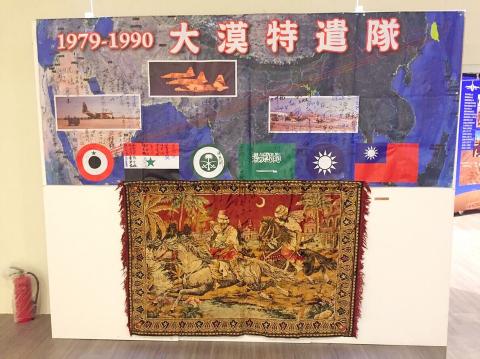A secret military mission to Yemen by the air force is commemorated with a special exhibition at the Air Force Museum that opened on Saturday, 40 years after Taiwanese troops were deployed to help North Yemen forces.
The now declassified military aid program, which the air force conducted from 1979 until 1990, began with a request from then-diplomatic ally Saudi Arabia to aid its ally, the Yemen Arab Republic, which had no ties with Taiwan, a Ministry of National Defense official said, speaking on condition of anonymity.
North Yemen at the time was engaged in a rivalry with the People’s Democratic Republic of Yemen, which it fought during a brief war in 1972.

Photo courtesy of the Republic of China Air Force Museum
The countries in 1990 formed the Republic of Yemen, but strife returned to the region in 2017.
The air force denies ever flying any combat missions over Yemen.
In what was known as the Great Desert Program (大漠計畫), the air force deployed more than 1,000 personnel — including pilots and ground crew — to assist and advise the North Yemeni air force, until Saudi Arabia withdrew its diplomatic recognition of Taiwan, ending the program, the official said.
Many participants in the program would rise to prominent military and civilian positions, including Deputy Minister of National Defense Shen Yi-ming (沈一鳴) and former Civil Aeronautics Administration director-general Billy Chang (張國政), the official said.
The exhibition features records and documents, as well as uniforms, insignia and photographs from 200 veterans who participated in the mission, the official said.
On the opening day, the Air Force Academy presented a commendation of gratitude to personnel involved in the mission on behalf of the armed forces.

Chinese Nationalist Party (KMT) Chairman Eric Chu (朱立倫), spokeswoman Yang Chih-yu (楊智伃) and Legislator Hsieh Lung-chieh (謝龍介) would be summoned by police for questioning for leading an illegal assembly on Thursday evening last week, Minister of the Interior Liu Shyh-fang (劉世芳) said today. The three KMT officials led an assembly outside the Taipei City Prosecutors’ Office, a restricted area where public assembly is not allowed, protesting the questioning of several KMT staff and searches of KMT headquarters and offices in a recall petition forgery case. Chu, Yang and Hsieh are all suspected of contravening the Assembly and Parade Act (集會遊行法) by holding

PRAISE: Japanese visitor Takashi Kubota said the Taiwanese temple architecture images showcased in the AI Art Gallery were the most impressive displays he saw Taiwan does not have an official pavilion at the World Expo in Osaka, Japan, because of its diplomatic predicament, but the government-backed Tech World pavilion is drawing interest with its unique recreations of works by Taiwanese artists. The pavilion features an artificial intelligence (AI)-based art gallery showcasing works of famous Taiwanese artists from the Japanese colonial period using innovative technologies. Among its main simulated displays are Eastern gouache paintings by Chen Chin (陳進), Lin Yu-shan (林玉山) and Kuo Hsueh-hu (郭雪湖), who were the three young Taiwanese painters selected for the East Asian Painting exhibition in 1927. Gouache is a water-based

Taiwan would welcome the return of Honduras as a diplomatic ally if its next president decides to make such a move, Minister of Foreign Affairs Lin Chia-lung (林佳龍) said yesterday. “Of course, we would welcome Honduras if they want to restore diplomatic ties with Taiwan after their elections,” Lin said at a meeting of the legislature’s Foreign Affairs and National Defense Committee, when asked to comment on statements made by two of the three Honduran presidential candidates during the presidential campaign in the Central American country. Taiwan is paying close attention to the region as a whole in the wake of a

OFF-TARGET: More than 30,000 participants were expected to take part in the Games next month, but only 6,550 foreign and 19,400 Taiwanese athletes have registered Taipei city councilors yesterday blasted the organizers of next month’s World Masters Games over sudden timetable and venue changes, which they said have caused thousands of participants to back out of the international sporting event, among other organizational issues. They also cited visa delays and political interference by China as reasons many foreign athletes are requesting refunds for the event, to be held from May 17 to 30. Jointly organized by the Taipei and New Taipei City governments, the games have been rocked by numerous controversies since preparations began in 2020. Taipei City Councilor Lin Yen-feng (林延鳳) said yesterday that new measures by